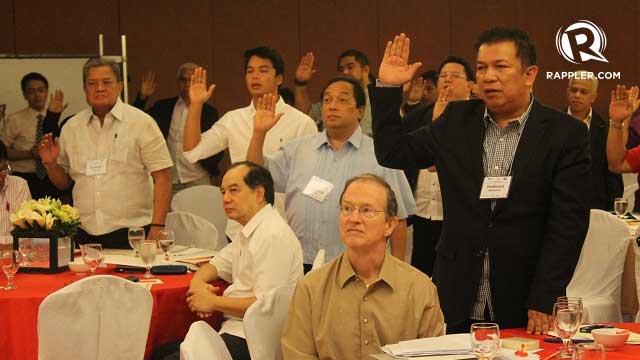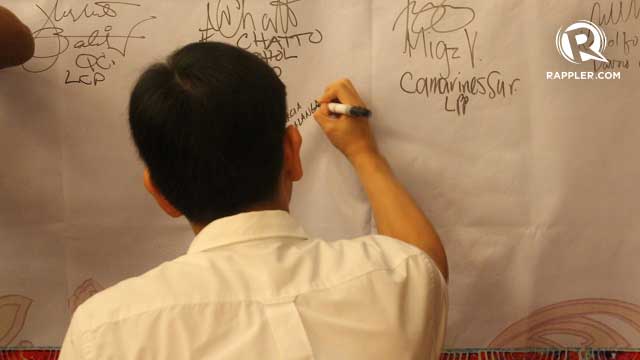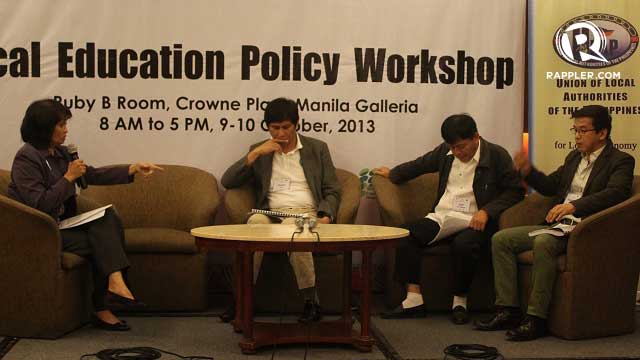SUMMARY
This is AI generated summarization, which may have errors. For context, always refer to the full article.

MANILA, Philippines – In Asturias, Cebu, private organizations helped the local government build more schools. But Mayor Alan Adlawan saw something else was missing: school fences.
He could’ve tapped their partners again to ask for more help. But he believed in his community and in what it can do. So while it took much prodding, he eventually convinced students and teachers to conduct fund raising concerts to build the much-needed fences.
“We make the school earn,” Adlawan shared during a workshop on basic education policy reforms on Thursday, October 10, in Pasig City. (READ: LGUs told: Graduates need not always head to Manila)
The workshop was organized by ULAP or Union of Local Authorities of the Philippines, the umbrella organization of all local government leagues.
Over the course of two months, ULAP consulted with 26 local government units (LGUs) in the country to identify issues in local education.
Results of the consultations showed that supply issues remain to be a concern on the ground despite the Department of Education’s (DepEd) efforts to close backlogs in classrooms, teachers, books, comfort rooms and classroom seats, among others.
League of Municipalities of the Philippines (LMP) president Sandy Javier said basic education needs are lacking in many LGUs, especially the poorest ones.
Fortunately, more LGUs are taking up the responsibility of improving the quality of education in the country. In fact, before the workshop started, about 50 local chief executives pledged to be champions of education reform.

Coordination with DepEd
LGUs also face difficulties in collaborating with their local DepEd divisions, ULAP noted. For example, in Tayabas City, Quezon, the planning schedule of the LGU is not in sync with the plans and budget needs of the schools.
Mayor Dondi Silang created a technical working group represented by school teachers and principals, DepEd supervisors, and LGU officials so that any resolution passed may be cascaded down to the remotest barangays.
“What happens is that central schools always benefit [from resolutions], with the farthest schools left with almost nothing,” Silang said in a mix of English and Filipino.
Tarlac Gov Victor Yap said because education has not been ingrained in the set-up of LGUs, the lack of organization causes discord in education reform.
“A certain devolution [of DepEd] perhaps may be considered,” he said. About 20% of Tarlac’s budget is spent in education, he added.
But he said the most effective initiative is the local government’s sponsorship of the teachers’ graduate studies. The first batch of scholars number to 1,000 teachers in the province.

Addressing poverty
Another issue, ULAP said – and perhaps the most important one – is the relationship of education with other service delivery areas such as poverty incidence.
“Hindi puwedeng hiwalay ang education program sa kahirapan (Education programs should not be removed from the realities of poverty),” Mayor Jun Pacalioga of Dumingag, Zambaonga del Sur, said.
The worsening poverty in the municipality alarmed Pacalioga, moreso when he realized the fact that their high school graduates did not have skills in farming. Farming, according to him, is where the future of the residents depend on.
“We should contextualize curriculum, [and teach the] youth based on [the] real situation,” Pacalioga said.
So what the municipal government did was integrate sustainable organic agriculture in the school curricula, from kindergarten to college. After three years, he said, students in half of Dumingag’s 44 barangays were studying farming.
The LGU consultations were done in partnership with The Asia Foundation. Country representative Steven Rood said one of the best leadership examples is the late Interior Secretary Jesse Robredo, who believed engaging more stakeholders enhances education outcomes.
“The Department of Education admits that it cannot improve the state of Philippine education on its own and espouses that ‘everyone has a stake in education’,” Rood added. – Rappler.com
Add a comment
How does this make you feel?
There are no comments yet. Add your comment to start the conversation.